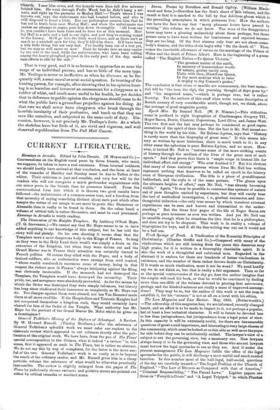Epoch Men. By Samuel Neil. (W. P. Nimmo.)—This ridiculous name
is prefixed to eight biographies of Charlemagne, Gregory VII., Roger Bacon, Dante, Chaucer, Copernicus, Lord Olive, and James Watt. The two first and the last may perhaps be considered as good repre- sentatives of the spirit of their time.. But the fact is Mr. Neil meant no- thing in the world by his title. Sir Bulwer-Lytton, says that "History is rarely more than the biography of great men." If this means his- tory as written by most historians, there is mach truth in it ; in any other sense the aphorism is pure Bulwer-Lytton, and no . more. How- ever, it incited Mr. Neil to "narrate some of the more striking events of history through the medium of the lives of the groat men of each epoch." And they prove that there is "ample scope in human life for individual effort and energy." Who ever doubted it ? But it is obvious that many of these eminent persons whose lives Mr. Neil has written represent nothing that deserves to be called an epoch in the history even of European civilization. The title is a piece of grandiloquent balderdash, and the style is of the same pattern. "The gleam upon the ultimate heights of effort," says Mr. Neil, "was already becoming visible." Again, "It may be possible to construct fine systems•of nature out of pure thoughts excited by experience, but they will rarely bear the test of methodical investigation, i. e., gradual succession and fore- thoughtful induction—the only true means by which transient external experiences can be seen and known and transmitted to the under- standing." Bat the three first pages of the life of Roger Bacon are perhaps as pure nonsense as ever was written. And yet Mr. Neil can be sensible enough when he abandons the idea that he is a philosopher, and does not try to be eloquent. This work is in reality a volume of biographies for boys, and if all the fine writing was out out it would not be a bad one.


































 Previous page
Previous page